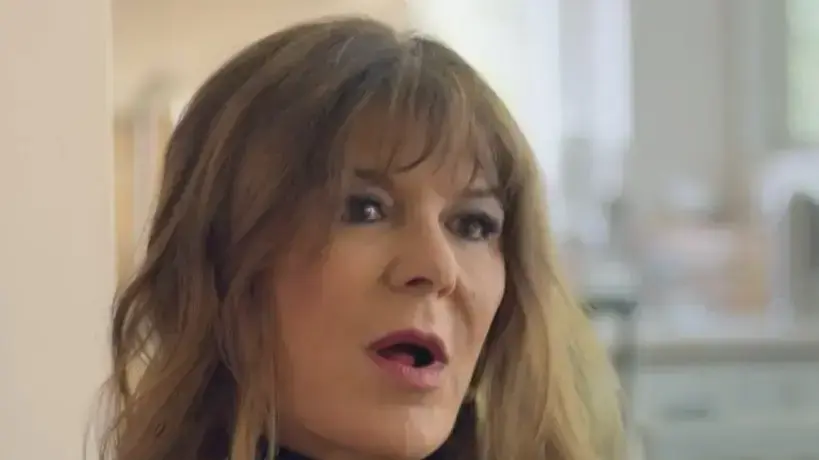Rina Mishleh breaks up in the last program of "Meet the Press" (News 12)
Last month, Rina Mishleh announced her retirement from News 12 after almost three decades in the company.
The announcement of the retirement of Mishleh came barely four months after she retired/was retired from presenting the program she became most identified with, "Meet the Press", and was replaced by Ben Caspit and Amit Segal.
In her retirement announcement, Mishleh, who has never left the impression of a particularly restrained person, did not spare her criticism both towards "political camps that want to harm the free press" and towards what she called "flexibility of professional principles".
The film "Women of the Revolution" that she created together with Idit Abrahami and aired yesterday on Channel 12, is her first significant project since that retirement and perhaps marks the places to which she aims to steer her career in the future.
The first connotation that comes to my mind from the name "women of the revolution" are the brave women who risk their lives these days when they demonstrate against the authorities in Iran as part of the hijab protest.
The film by Mishleh is not at all about that protest, but about the news women of Israeli television, those who were and still have to fight for their place on the screen, to prove that they are there because of their skills and not as an "ornamental item" alongside male journalists and the way to deal with criticism that often spills over into the provinces unprofessional.
On paper, Mishleh is not satisfied with a historical review and interviews, but seeks to challenge herself and answer the question: "Does the fact that there are more women on the screen mean that their status is the same as that of the men?".
Rina succeeds (photo: screenshot, Keshet 12)
The successful use of archival materials, especially those from the days of the Broadcasting Authority, may cause a feeling of euphoria.
When you see the journalist Dalia Mazor, who is also successful as an interviewer, reporting from fashion shows, hair salons and beaches, it is easy to understand the very problematic starting point that the Israeli media started with.
Al Mazor is usually referred to as "the first woman of news in Israel", a title that I think she deservedly earned, but in the film she shares an honest and interesting insight.
According to her, because she never really got to cover the issues that really interested her and the limits of her demeanor were limited to the "soft" issues, she often feels as if she does not deserve the praise she receives.
It's easy to see what she means when you watch those archive clips of the Broadcasting Authority, and it's hard not to cringe in the face of the unapologetic chauvinism.
In general, the archive often presents materials that speak for themselves.
For example, one of the first television appearances of two of the most prominent journalists in Israel - Ilana Dayan and Carmela Menashe.
The two came to be guests on Rivka Michaeli's "Reason for a Party" program as part of the "phenomenon" of women taking up more broadcasting positions on the radio.
Dayan and Menasha, both heavily made up in the spirit of the eighties (Dayan even wears a skirt) look embarrassed even then by the "costume" they have to wear when they are on the screen.
Here it is worth referring to a conversation between Mashil with Dan Shilon, who was the CEO of the Channel 1 news company, in which he strikes a sin and admits that he aligned himself according to the values he knew and did not do enough to promote women on the screen. Mashil doesn't give up and tells Shilon that the conduct at the Broadcasting Authority was chauvinistic, A claim he doesn't really refute, but he doesn't completely disavow it either, but unfortunately the film doesn't explore this issue enough.
More in Walla!
Rina vs. Amit, Noa vs. Kanye: the big clashes of November 2022
To the full article
Miki Chaimovich (photo: screenshot, Keshet 12)
On the timeline you sketch, the significant improvement in the status of female journalists on Israeli television came together with the establishment of the news company of Channel 2. So, in an attempt to differentiate themselves from Channel 1, the news chose to present a double presentation format in the main edition and introduced us to the duo Miki Chaimovich and Yaakov Elon.
The story of Chaimovich and Elon has already been told many times - from the fact that Miki was "forced" on Yaakov who aspired to submit the edition alone to that cool and famous kiss on New Year's Eve of the year 2000.
And yet, it is still interesting to hear Chaimovich describe the war she waged for equality in submission, receiving equal credit in the names that appear on the screen when the edition opens (one evening her name appeared first and another evening Elon's name appeared) to the insistence that she be the one to open the edition in half from the Arabs.
Yes, a few years earlier only male presenters would greet viewers with "good evening" while the women would smile and nod.
Here too, the issue that is not talked about enough is the money.
Although Haymovich and Elon had the same title, their salaries were quite different.
When she moved to News 10 she made sure to guarantee herself a decent salary and immediately received a lot of criticism including an illustration of her swimming in a bathtub full of dollars.
To remind all of us, it was already deep into the 2000s and here it is no longer possible to place the blame on the senior officials of the Broadcasting Authority.
Another senior official who is speaking is Golan Yochpaz, currently CEO of the Broadcasting Corporation and formerly the editor of Mashilh at "Olapan Shishi". The conversation between the two is interesting because it touches on the positions between men and women behind the scenes of the television industry. Yochpaz says that almost from the beginning of his career he was paved for editorial positions, Which later helped him to also get key positions. When Mazaya asks why there aren't more women in leading editorial positions, Yochpaz, a liberal person by all accounts, replies that maybe it doesn't suit everyone. An answer that illustrates that even in the younger generation the gaps in perception are still alive and kicking.
Rina succeeds (photo: screenshot, Keshet 12)
Majleh could and should have dug much deeper into the wage gaps that still exist in the media, but it seems that she tried to cover many topics in a short time.
For example, she meets the Kaan 11 journalist Hadas Greenberg, who just this year was the first Israeli journalist to report from the war in Ukraine and was once again the recipient of criticism columns that mainly referred to her appearance.
She also talks to Nega Nir Naaman from News 13 who herself received vicious criticism about her weight when she started presenting the channel's newscast.
Even Adwa Dadon, one of the most prominent journalists in the younger generation of News 12, knows the issue of gender in everything related to the media and work on the screen, even if she started working in the media long after the first channel lost its relevance.
Dadon tries to clarify the premise of success and says that it is not necessarily related to the differences between men and women, even though she herself confirms that female journalists have to work very hard so that they pay attention to what they have to say and not just to how they look.
"Women of the Revolution" is not a bad baptism of fire for a successful in the field of documentaries (in the lean and concise version that Sheshet 12 has become a tradition) but at the same time it also gives the impression of a film that should have received more.
More screen time, more investigation and more digging deep into the open wounds worth discussing.
The most demanding of all is the situation of Mishlekh herself who, although she created the film from News 12, but at the end of the day found herself outside the company when she lost the role of presenting the number one current affairs program in favor of two men and without being offered another position that suits her position.
Even a short conversation that Mosej conducts with the chairman of the board of news 12, Tami Hausner-Roh (one of the women who have the most influence on our screen that we don't know), deserved more screen time.
At a time when it seems that equal rights between the sexes and minority rights in general are in tangible danger For real, one can only hope that the "women of the revolution"
culture
TV
TV review
Tags
Rina succeeds


/cloudfront-eu-central-1.images.arcpublishing.com/prisa/OOBF5MCTLJGB5J5O4SKHMULMK4.jpg)


/cloudfront-eu-central-1.images.arcpublishing.com/prisa/EBHENXRGOJHO5LQC3SOETK7VMY.jpg)



